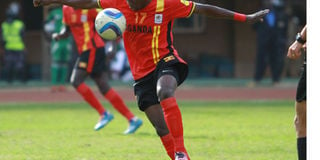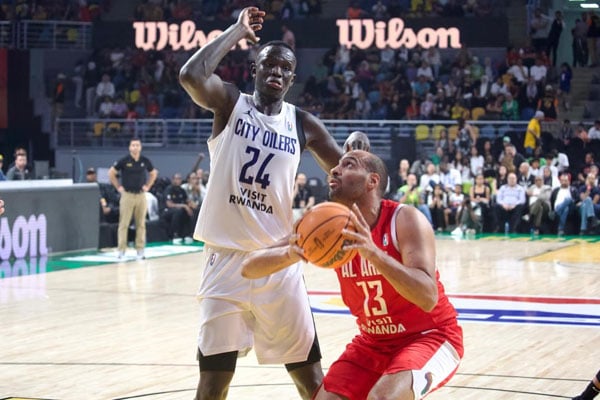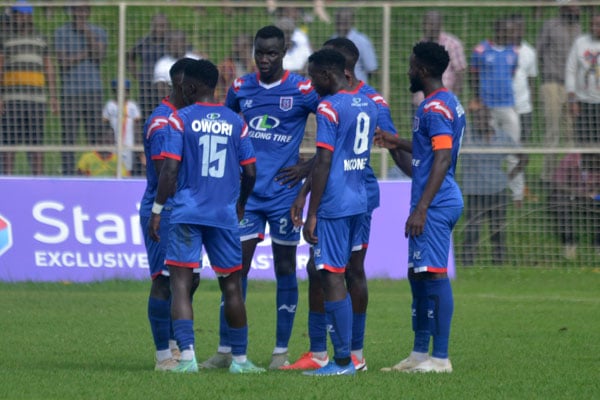Why chartering plane puts Cranes in a strong position

Midfielder Miya is credited for having scored the goal that broke Uganda’s Afcon jinx. PHOTO BY JOHN BATANUDDE
Football is a game of fine margins both on and off the pitch. Travelling across Africa’s vast airspace can be quite energy-sapping and the nations that charter planes for double headers likes this one always have a slight advantage.
Ever since African football governing body Caf opted to shoehorn its Africa Cup of Nations qualifying doubleheaders into a constricted period, an almost uniform pattern has emerged.
A pattern that has the doubleheaders playing the role of kingmaker.
Put simply, chances of reaching the Africa Cup of Nations (Afcon) finals fall steeply if you perform dismally in a doubleheader.
That certainly was the case for Uganda during the 2015 Afcon qualifying campaign when they suffered identical 1-0 losses at the hands of Togo in the space of four days.
A campaign that started brightly with a draw in Ghana (that — for an atrocious piece of refereeing — could well have been a win) and a convincing win at home to Guinea eventually petered out.
Observers were quick to attribute Uganda’s horror show against Togo’s Sparrow Hawks in Lomé to failure to charter a plane to the West African country.
They were vindicated when almost a year later the Cranes used Farouk Miya’s free-kick to exert a degree of revenge on the Sparrow Hawks at Stade de Kégué.
The key difference on this occasion was that government chartered a plane for the Cranes to Lomé for the 2018 Fifa World Cup qualifying preliminary match.
Football is a game of fine margins both on and off the pitch.
Travelling across Africa’s vast airspace can be quite energy-sapping if anything because of the punishing layovers.
The benefits of chartering planes cannot be understated especially for players who are anything but impervious to jet lag. During the 2017 Afcon qualifying campaign, Uganda dropped the ball in its doubleheader thanks in no small part to government’s failure to charter a plane for the team to Ouagadougou. The Cranes followed up a 1-0 loss at Stade du 4 Août with a languid draw at Namboole.
Jonathan Pitroipa, the match winner in Ouagadougou, almost settled the contest late on when an uncharacteristic blooper from Onyango — occasioned by mental fatigue more than anything else — gave the striker a sniff at goal. Fortunately this did not cost the Cranes dear as they went on to do the double over the other sides (Botswana and Comoros) in the qualifying group.
On Tuesday, Uganda plays away to Lesotho in a 2019 Afcon qualifier. The match will come hot on the heels of Saturday’s reverse fixture.
Thankfully for the Cranes, government has managed to charter a plane to Maseru. So there should be no excuses, really.
Ugandan athletes should know it’s ok not to be ok
This past week brought with it World Mental Health Day. It is a day when we are expected to say with great clarity as much as a dash of care and thoughtfulness that it’s ok not to be ok.
Except that rarely is the case in sporting circles.
Athletes struggle to talk about mental health issues openly.
Psychological issues are handled rather gingerly, if they are acknowledged at all.
This is down to many things, but mostly because machismo in sport much considers mental illness the byproduct of weakness of character. Needless to say, such misguided ideas have cultivated a culture of silence.
Silenced by stigma, athletes find themselves grappling with treatable conditions. They survive, barely. Many of them have in fact fallen prey to alcoholism whilst trying to deal with mental illnesses however they can. Bouts of anxiety and depression as well as conditions caused by trauma have taken a toll on many an athlete. Yet the affected parties always choose to put a sock in it.
The bitter truth is that mental health issues are very much a part of modern-day sport. Guilt, sadness and suicidal feelings aren’t unfamiliar to athletes.
It is therefore vitally important that more support be given to athletes to help them recognise signs of depression and — most importantly — suggest ways of tackling it.
The world of sport can be quite brutal. It teems with huge mental and emotional demands so much so that an unbearable weight often bears down on athletes.
Exacerbating matters is the media that can be as hysterical as it is unforgiving in its treatment of sporting failure. Consequently, the pursuit of perfection has led to both burnout and depression in athletes.
Your columnist has spoken to players grappling with long-term injuries, ex-internationals toiling to adapt to retirement and youngsters who have failed to break into paid ranks of teams. All have sounded broken.
Even depressed. Sadly, either because they are intensely private or clueless, many choose not to get help. This firmly keeps them in a dark place.
This silence must be supplanted by openness. It’s ok not to be ok.
What we now know....
We now know that City Oilers have a chance to defend their National Basketball League title (maybe) today.
Mande Juruni’s side leads the best-of-seven playoffs finals against Betway Power 3-1.
We know that Oilers have reeled off three straight wins after they suffered a blowout defeat in game one.
Should Oilers beat Power today, as many expect them to, they will draw level with record Ugandan champions Falcons on six titles.
Odds stacked
We also know that the odds are stacked against Power.
Arnold Lando’s side has never won more than one game in its five previous playoffs meetings against Oilers. We know that Oilers beat Power 3-0 in last season’s playoffs semifinals. Before Power had suffered lopsided defeats during the 2015 (3-1) and 2016 (4-1) post-seasons.
And who could forget the 2014 playoffs finals sweep? Power fans must be sick of the sight of Oilers.




